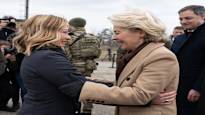We are often asked if we have power. The position of individual MEPs varies, but as a mass force in their groups, they wield quite a lot of power in the EU.
Hannele MuiluEU correspondent
BRUSSELS The European Parliament exercises great power right at the beginning of its term.
The summit of EU leaders nominates the President of the Commission, but the Parliament must approve the choice. The EU Parliament is not a rubber stamp here. It learned, especially in the last election, to trade with choice.
After the 2019 elections, the top candidate of the largest party group, the center-right EPP by Manfred Weber was supposed to be the next president of the commission. However, Weber was not suitable for the leaders of the EU countries, who want to keep the choice in their hands. President of France Emmanuel Macron pulled the German from the side into the lead Ursula von der Leyen.
At the same time, the leaders wiped the table with the top candidate model, which has been the parliament’s attempt to transfer the election results to the elections. Even though Weber was not to everyone’s liking in the parliament, the groups were disappointed.
In return, the parliamentary groups took a good price for accepting von der Leyen. The Commission’s work program fulfilled their wishes. Von der Leyen committed himself to many projects at the very beginning in such a way that he could not back down.
Parliament will probably make the most of the choice this time as well. The likely candidate, von der Leyen, or anyone else, will not receive unreserved support. Even recently, the decision came with a majority of only a few votes.
As a condition, the groups of the Parliament submit their goals to the Commission’s work program.
The far-right is predicted to win the election, and in the negotiations, the ECR of the national conservatives aims, among other things, to emphasize the role of nation states and a smaller EU.
The Social Democrats hold the position of the second largest group, so it gets, for example, social Europe in its work program.
Power is concentrated in the parliament for political groups. Outside of them, the members have almost no say.
The composition of the groups usually changes somewhat after the elections. Now it’s bubbling, at least in the far-right and liberals.
The right is competing for Meloni’s popularity
In the middle of the power struggle of the Italian Prime Minister by Giorgia Meloni encirclement has become an election phenomenon. He is sought as an ally by both the far-right and the center-right.
Von den Leyen, who needs support for the next season, has been friends with Meloni for at least the entire beginning of the year.
A rival suitor suddenly appeared from France, when the National Alliance Marine Le Pen proposed to Melon to establish a new joint group after the EU elections. If other far-right parties and possibly new entrants are included, the group could become the second largest in parliament, overtaking the Social Democrats.
The national coalition belongs to the far-right ID group, while Meloni’s Italian brothers are in the national conservative ECR group.
Italy has never played such a significant role in the negotiations, Meloni himself has stated. He hardly reveals his cards until he has to.
Melon is now praised in the EPP Petteri Orpoa until becoming a constructive politician. Admittedly, praise has started to be frowned upon even in one’s own party. Sirpa Pietikäinen (collect.) according to Melonia and not the whole ECR group should propose.
The supergroup would gain visibility
A large number of MEPs would bring visibility to a large group of the far right and it would get its issues heard. However, other groups would hardly cooperate with the supergroup, so its power would remain at the level of giving speeches.
Other groups are already refusing to cooperate with ECR and ID groups. The exception is the EPP, which lends a hand to some of the ECR group members, such as Meloni’s party.
The ID group’s pro-Russia attitude in particular repels others.
In the past, the cooperation of far-right parties has fallen into too different goals. The German AfD was already kicked out of the ID group.
The position of the centre-right is getting stronger
An election victory is predicted for the far-right, where the number of seats for the ECR and ID groups would increase to 144. That would be a fifth of 720 MEPs. In addition, mepps from among those without a group may join the group.
The position of the center-right EPP will be strengthened if the Greens and the Left lose seats.
This season, the so-called grand coalition, i.e. EPP, S&D, Liberal Renew and the Greens, has most often been sought behind the decisions.
However, a centre-left majority has also been possible, where the EPP has been replaced by the Left. If the predictions are correct, this group will no longer form a majority.
In practice, the EPP would always be needed behind the decisions, which could also seek support from the ECR group in the future.
Understand the impact of your vote in the European elections: Our MEPs work in such groups and influence the EU Parliament
